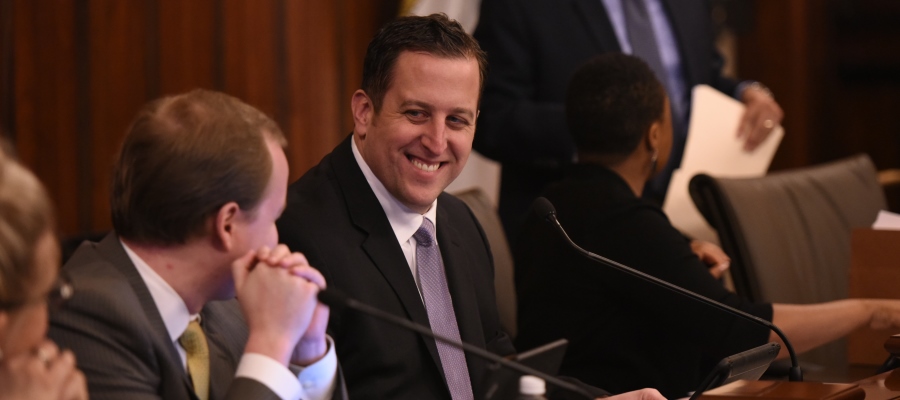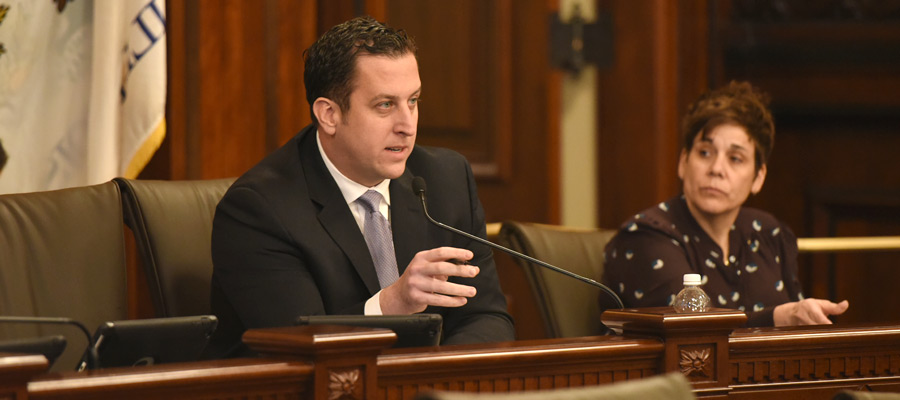- Details
- Category: Press Releases

TINLEY PARK—Starting Jan. 1, 2019, Illinois law will require children under the age of two to be properly secured in a rear-facing child restraint seat unless the child weighs 40 or more pounds or is more than 40 inches tall.
State Senator Michael E. Hastings (D-Tinley Park) championed the measure. House Bill 4377 passed the House and Senate with bipartisan support.
“Public safety is our number one priority. This new law will ensure our children are safe should disaster strike,” Hastings said. “Car crashes remain the leading cause of death for children under the age of 13. It is absolutely imperative that we do whatever we can as lawmakers to save lives.”
A 2007 study in the Injury Prevention Journal found that children under age two are 75 percent less likely to die or to be severely injured in a crash if they are in rear-facing seats.
The American Academy of Pediatrics states rear-facing child safety seats give better support to the head, neck and spine of infants by distributing the force of the collision over the entire body.
“One life lost is too many,” Hastings said. “We have solid evidence that will help us save lives. It’s our job as parents to utilize best practices and protect the lives of our children.”
- Details
- Category: Press Releases

SPRINGFIELD – The Illinois Senate recently honored the sacrifices of an Illinois native that was a member of the historic Tuskegee Airmen.
State Senator Michael E. Hastings, a U.S. Army Veteran, passed a resolution honoring the late Robert Leander “Bob” Martin during the General Assembly’s Legislative Veto Session. Martin was a fighter pilot with the Army Air Corps and one of the “Red Tails,” a historic group of black fighter pilots that served in World War II.
“We must honor the endless sacrifices Captain Martin made to protect our great nation and to preserve the history of our heroes,” Hastings said. “This brave leader devoted countless hours to preserving our freedom, then to preserving the legacy of the trailblazing Tuskegee Airmen long after his tenure in the service.”
Martin served with the 100th Fighter Squadron of the 332nd Fighter Group in the European Theater of Operations. In March 1945, during his 64th and final combat mission, his plane was hit by ground fire while strafing the aerodrome at Zagreb, Yugoslavia, now Croatia.
He was forced to parachute from his burning plane and was rescued, spending the next five weeks at an allied mission before returning to his base in Ramitelli.
“Captain Martin dedicated his life to serving our country,” Hastings said. “He lived a great life full of honor and love for our country and his amazing family.”
Martin earned several service medals, including the Distinguished Flying Cross, the Purple Heart and the Air Medal with 6 Oak Leaf Clusters. He also earned a series of civilian honors, the most notable being the Congressional Gold Medal in 2007.
“Our state lost a true patriot,” Hastings said. “We all must aspire to live a life dedicated to service to our nation, state and community as Captain Martin did. He will be missed tremendously.”
Senate Resolution 2058 passed with unanimous support in the Senate.
- Details
- Category: Press Releases

SPRINGFIELD – Despite a veto from Gov. Bruce Rauner, State Senator Michael E. Hastings (D-Tinley Park) lead the charge in the Illinois State Senate to help provide justice to the 14 families who lost loved ones to a Legionnaire’s disease epidemic at the Illinois Veterans Home at Quincy.
Hastings’ Senate Bill 2481 would remove a $100,000 cap for state payouts in civil litigation. The measure will allow families greater restitution for the loved ones who died as a result of state negligence and mismanagement. The Illinois Senate overrode Rauner’s veto of Senate Bill 2481 with bipartisan support on Wednesday.
Hastings, a military veteran, noted a total of 14 people have died and more than 60 have fallen ill at the Quincy Home from exposure to the Legionella bacterium since August 2015.
“The only person who is opposed to this measure is Gov. Bruce Rauner. This bill will provide some semblance of justice to the military families of the 14 veterans who were victims of administration’s gross negligence and failure of leadership,” Hastings said.
The Senate’s move to override the veto comes in light of news that a grand jury subpoenaed Rauner’s office and state agencies for Legionnaires’-related records tied to outbreaks at the home.
Last week, WBEZ reported that the grand jury had also subpoenaed the state public health department.
“I cannot begin to comprehend the loss these families have had to go through,” Hastings said. “We were trusted to care for these veterans in their golden years after their families already sacrificed so much during their times of service. Our hope is this measure will help the military families that suffered this great tragedy receive justice.”
Senate Bill 2481 now heads to the House for consideration.
- Details
- Category: Press Releases

TINLEY PARK – Local residents were given a public forum to share input on clean energy efforts last week thanks to State Senator Michael E. Hastings (D-Tinley Park).
Hastings, the Chair of the Senate’s Energy Committee, worked with environmental groups and energy associations to host a town hall meeting which allowed people to voice their opinions and give input on what initiatives need to be considered in Springfield to increase energy-efficiency programs, decrease utility costs and create great jobs in the South Suburbs.
“The future of energy is extremely important,” Hastings said. “It’s important that we consider the opinions and needs of the people of our communities before acting on major energy legislation in Springfield.”
The town hall featured tables with information about energy programs and representatives of utilities and various groups.
“I want to hear what’s important to you and hopefully take that back to Springfield and make some changes,” Hastings told a packed room at the Virgil I. Grissom Middle School in Tinley Park.
Hastings worked in a bipartisan manner to implement commonsense clean energy legislation. The law was the result of negotiations among consumer advocacy groups, environmental groups, utility companies and energy policy stakeholders.
“The best policies are those that are a direct representation of the needs and wants of the people of Illinois,” Hastings said. “It’s absolutely vital that we all work together to pass meaningful legislation that will ensure our energy bills are affordable, protect our ecosystems and keep our lights on year round.”
More Articles …
Page 48 of 87


